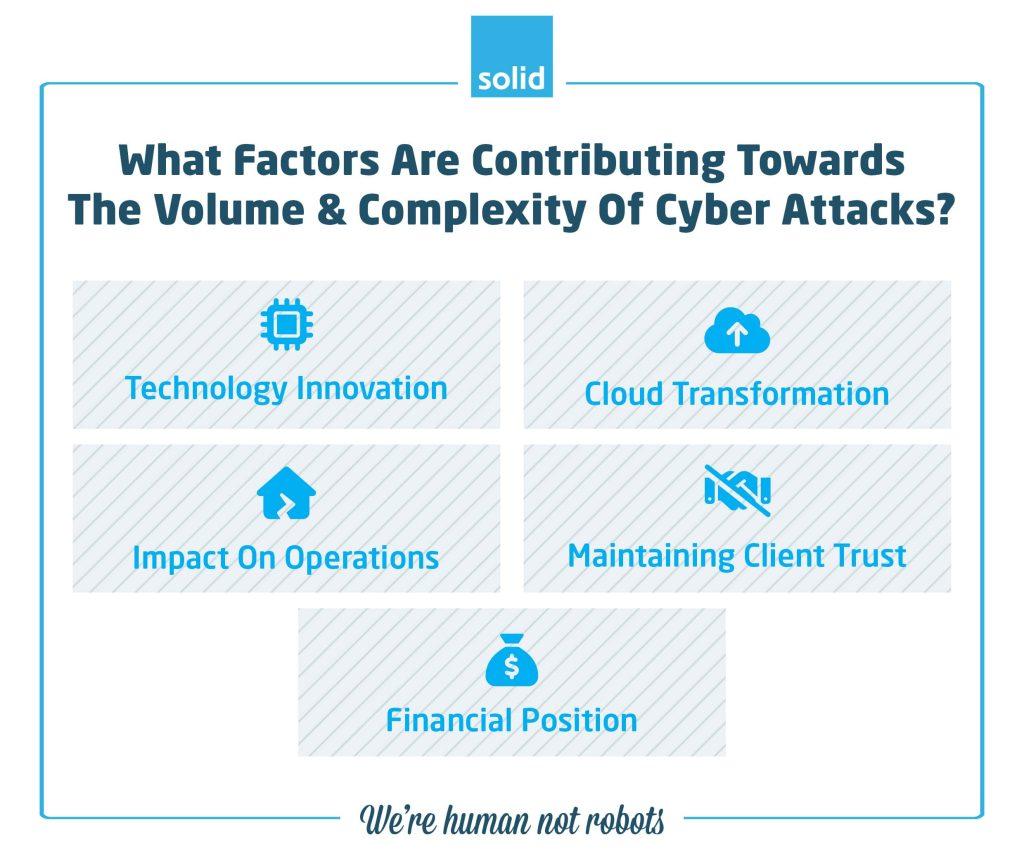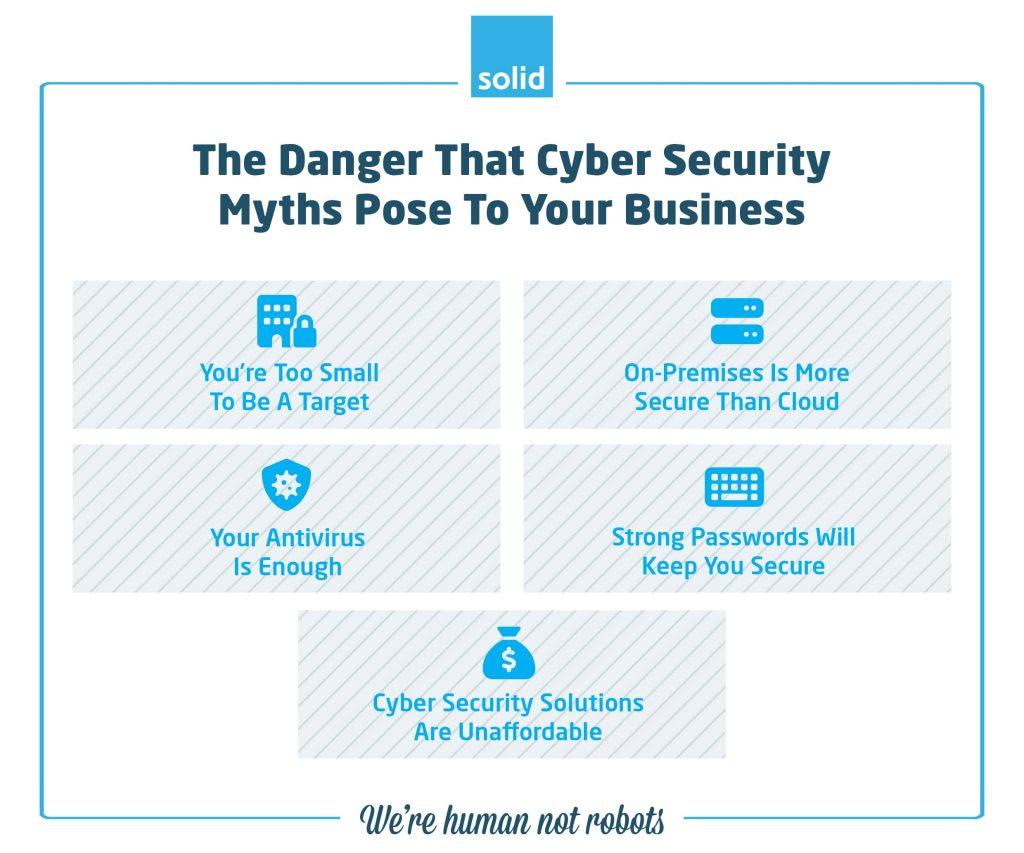
The importance of cyber security in a digital world cannot be underestimated. And yet, businesses still seem to have a lack of understanding when it comes to the steps that they should be taking to protect themselves against the threats to the users, their data, and their operations. So many companies assume that because they are small, they are unlikely to become targets for cyberattacks. But in reality, this couldn’t be further from the truth.
Why Has The Importance Of Cyber Security Become A Priority For Business?
As more businesses are embracing digital tools to enhance productivity and efficiency, so attackers are finding new ways to infiltrate these tools and exploit vulnerable businesses and their weaknesses. Cyberthreats are becoming ever more sophisticated and more common, while businesses are finding themselves at a loss when it comes to identifying them and protecting against them. This has highlighted cyber security importance over the last few years in particular, as more data has been generated, processed and, in turn, compromised, leading to unnecessary expenditure and a loss of client trust.
Why Is It Necessary For You To Learn About The Importance Of Cybersecurity?
With so many different types of attacks threatening companies around the world, it has become critical that businesses gain a better understanding of cyber security importance. Ignorance is no longer bliss. The better understanding you have of the risks that are facing your operations, the better prepared you can be to counter them. And with threats constantly shifting, it’s not enough to learn about current threats and only protect against those either. Focusing on the importance of cybersecurity in business, and grasping why information security is important as well. means constantly keeping yourself and your humans updated on the latest threats, and implementing technologies and best practices to help your company protect against them.
Why Is Cyber Crime Increasing?
Businesses are more reliant on data than ever before, and attackers are taking advantage of this reliance for their own personal gain.
Take, for example, the adoption of cloud solutions. Adopting cloud services is no more risky than on-premises alternatives – a myth that I will look at later in this article. But whenever a company makes a shift to a new platform, there are inherent risks involved, and considerations that many businesses overlook in their rush to adopt new technologies and make use of the benefits that these newer platforms can provide. And because so many businesses are making the shift to cloud services without understanding the risks involved, cyberattackers are taking advantage of their vulnerabilities, and are finding it to be a lucrative endeavour.
Businesses rely on data to operate effectively, after all, and have no choice but to pay ransom demands or face closure if their data becomes compromised by an attacker and they haven’t adequately prepared by backing up their data regularly. Even businesses that think they are well-acquainted with the importance of security awareness, and think that they are protected, can find themselves falling victim to attacks due to software vulnerabilities if their apps and devices aren’t effectively maintained and updated.
What Factors Are Contributing Towards The Volume And Complexity Of Cyber Attacks?

When looking at the reasons behind cyberattacks becoming more common and more sophisticated, there are a number of different factors that are contributing towards the increase.
• Technology Innovation
More technologies are emerging that offer businesses innovative digital solutions to do more with data, enhance productivity, and reduce costs. And while these solutions have plenty of benefits, they are also resulting in a switch to online services which are not always well understood, or well protected by the businesses using them. If the implementation and management of these platforms is not well thought out, the result can be vulnerabilities that companies are not aware of, and potential access points for cyber criminals.
• Cloud Transformation
Cloud services have the potential to make data management more effective and more secure, but most businesses that are moving their data into the cloud do not have a thorough understanding of their cloud environments. Take Microsoft SharePoint and Microsoft OneDrive for example. So many businesses expect that once they transfer their data into a Microsoft 365 environment, it is automatically backed up. They don’t realise the difference between cloud storage and cloud backup, and it leaves their business and their data vulnerable, since if an attacker gained access to their SharePoint and encrypted that information, they wouldn’t have an alternate option for its recovery.
• Impact On Business Operations
Businesses in today’s world are expected to always be online and available. Any disruption to your operations can be catastrophic for your reputation. And cyber criminals are well aware of this fact, using it to their advantage when orchestrating attacks. This is part of the reason that ransomware attacks have become so prevalent – it is often far simpler for businesses to pay an attacker’s ransom demands and retrieve their data quickly than it is for their operations to grind to a halt for hours or days at a time.
• Maintaining Client Trust
In the same way that businesses are expected to always be available, they’re also expected to be reliable in terms of the way that they handle, store, manage, and protect customer information. In the age of GDPR and the POPI Act, protecting personal data is critical, and an attack which compromises your clients’ information can not only result in substantial fines under those regulations, but is likely to result in losing your clients’ harder trust. If they can’t trust you with their information, why should they trust you with their money?
• Securing A Strong Financial Position
Every company wants to save money wherever they can. And for businesses that don’t understand the importance of cybersecurity, this often means cutting costs in the wrong areas, and leaving yourself vulnerable. You know what costs more at the end of the day than investing in cybersecurity solutions? An attack. It’s estimated that a single ransomware incident in South Africa costs anywhere from R14 million to R92 million, and that isn’t even taking into account the negative impact on your reputation and the loss of business.
The Danger That Cybersecurity Myths Pose

Understanding cyber security importance is critical to protecting your business, but one of the challenges in putting effective security strategies in place are the numerous myths that inundate the business world. These in themselves stem from a lack of understanding about technology and how to best keep your data and operations protected. Let’s tackle a few of the myths that I regularly come across.
• You’re Too Small To Be A Target
Small and medium businesses (SMBs) are actually prime targets for attack. And it’s partly because of thinking they’re too small for attackers to care about. They are easier to infiltrate because they don’t really have a grasp on what cyber security is and why it is important. Because of this, they don’t have strategies for preventing and dealing with attacks, and are more likely to give in to ransom demands if their data becomes compromised, because they have no fail-safe or back-up plan. And yes, that pun was intended.
• On-Premises Is More Secure Than Cloud
Don’t get me wrong – on-premises solutions can be extremely secure if they are effectively managed, maintained, updated and upgraded. The problem is that managing maintaining updating and upgrading on-premises infrastructure is significantly more difficult, more time consuming, and more expensive than its cloud counterparts. And it’s more restrictive to boot, since implementing new solutions or upgrading your on-premises hardware requires significant planning and expensive implementation, whereas cloud services can be upgraded, downgraded, or added to within minutes. Your data is only secure when it is effectively maintained, and an effectively maintained cloud server is far more secure than an unmaintained on-premises storage solution.
• Your Antivirus Is Enough
Back in the 90s and early 2000s, an antivirus was the best technology available for keeping your communications and devices protected. But technology has advanced, and relying on an antivirus’s database of known threats is simply not sufficient protection any longer. Tools like Microsoft Defender for Endpoints and Defender for Microsoft 365 are far better equipped for recognising potential threats and helping your company to avoid them by analysing usual behaviours, alerting you to suspicious activity, and training your teams on the importance of cyber security awareness, and how to recognise and guard against phishing attacks, for example.
• Strong Passwords Will Keep You Secure
When it comes to passwords, best practises are constantly shifting. Some people believe that passwords should contain randomly generated numbers and characters, while others feel that randomly generated passwords are too complex and forgettable to be a viable solution, resulting in login credentials that need to be regenerated or reset too often, which places your business at further risk. Still others believe that a single password to control and ‘unlock’ all other passwords and credentials is the best way to protect your company and your users. But when it comes down to it, no matter what type a password you use, having a single layer of protection for login credentials is no longer enough. What you need is Multi-Factor Authentication (MFA), allowing you to use devices like smartphones, or desktops that are already logged into a platform, to confirm every login.
• Cyber Security Solutions Are Unaffordable
This may have been the case in the past, but cloud security solutions have become so common, that they really can easily be incorporated into practically any budget. You may even find that your existing Microsoft business licences already make security solutions available for your company. What is truly not affordable is experiencing a crippling attack, which can cost your business tens of millions of Rands to resolve, and then still having to pay extra to protect your business against further attacks as a matter of urgency.
What Are The Advantages Of Prioritising Cyber Security?
When you have a deep understanding of cyber security importance, and have a strategy in place for protecting your data, your users, and your business, you’ll start to see the effect on your operations, even when you aren’t being targeted by cyberattacks. Some of the benefits that you’ll notice almost immediately include:
• Peace Of Mind
This is an advantage of cybersecurity that cannot be undervalued. When you are operating under the constant threat of attack, unsure of whether your data is safe and where the next cyber threat may be coming from, it is difficult to concentrate on the aspects of your business that are truly meaningful.
But when you have a thorough plan in place for your protection, you can rest easy knowing that you are prepared for almost any scenario. Even if your data does become compromised, you have a backup and recovery plan to restore it without needing to pay an extortionate ransom demand. You have a Disaster Recovery Plan which ensures that your entire team knows their roles in preventing, detecting and responding to attacks. Your teams are actively being trained in the best possible ways to protect your business. And with those reassurances behind you, you will be able to focus your efforts on achieving and surpassing your business goals.
• A Predictable Monthly Spend
One of the biggest effects that a cyberattack can pose is the impact on your financials. Suddenly you are needing to pay an attacker to have your data returned to you. Or you have to pay an external company to try and restore your deleted files. Or you have to pay an expert to dive into your systems and investigate and fix your vulnerabilities. And all of these scenarios involve unexpected expenses that are abnormally high, because they need to be dealt with urgently, or else you face further losses from your business grinding to a halt and your reputation taking a severe hit.
But when you decide to invest in cybersecurity solutions, there is a transparency when it comes to cost. You know what you are going to be paying each and every month, and can allocate your budget accordingly, knowing that the predictable monthly spend is going towards your business’ protection. And if a disaster or an attack does occur, it will have a significantly lesser impact on your finances, because you have already prepared for the worst-case scenario.
• Increased Trust
When you take cybersecurity seriously, it will have a positive impact for your business, not just in terms of the peace of mind that you are able to operate with, or the predictable nature of your expenditure, but in terms of the way that your humans and your clients feel about working with you. That peace of mind that you experience, knowing that you are as well protected against attacks as you can be, will translate into trust from the humans who work for your business, knowing that you are making every effort to keep them safe from attack as well. And when you communicate to your clients that you take the protection of their data seriously, that you are taking steps to ensure that their information, their investments, and their services are in safe hands, and that you don’t take cybersecurity lightly, they will feel more confident in trusting your business.
How Can Solid Systems Help?
At Solid Systems, we have been helping businesses to protect their data, their users, their devices and their technologies for the past two decades, and we have become one of the most trusted IT companies in South Africa because of our stance of helping humans to work more confidently, more productively, and do more with their time.
If you are looking for a Managed IT Services provider who can work with your business for strategic technology planning, Disaster Recovery planning, and put world-class cybersecurity solutions to their best possible use for your company, then you’ve come to the right place. Schedule your free consult today, and let’s discuss cyber security importance and how it fits into your unique business needs.
Frequently Asked Questions (FAQs)
Making cyber security a priority within your business can be critical to your success, helping you to protect your data, your users and your operations. By investing in cyber security tools and services, and by working with cyber security experts, your company will be less vulnerable to attacks, and less likely to see an attack crippling your operations if one does occur. Other benefits to putting cyber security strategies in place include:
- Better peace of mind
- A predictable monthly spend for security solutions
- Increased trust from your humans and your clients
Cyber security experts like Solid Systems have vast experiences in protecting businesses and ensuring that their data is secured against attack. We have spent over 20 years helping businesses to put the right technologies in place that will reduce the impact of cyberattacks, and see their companies thriving with the peace of mind that their operations can continue uninterrupted as far as possible, even if an attack does occur, because their data is backed up and easily recoverable, and because their systems are being regularly maintained to reduce the risk of an attacker taking advantage of a software or hardware vulnerability. On top of this, we put our experience to the best use for your business through training your teams in cyber security best practices, and in the ways that their own actions can add to your business’ protection.
The phrase ‘cybercrime’ covers a wide range of digital attacks. When it comes to your business, cybercrime or cyberattacks can include phishing emails, social engineering attacks, malware and ransomware attacks, or attackers infiltrating your systems through vulnerabilities in your software and hardware, or through any number of other methods. Because cybercrime is such a broad term, and because cyberattacks are becoming increasingly common and sophisticated, protecting your business against digital attacks requires a thorough and detailed cybersecurity strategy.
If I had to pick a single element of cyber security that is more important than any other, I would say that it is keeping regular backups of your data, and having a plan in place to ensure that they are easily recoverable if an attack occurs. It can mean the difference between a ransomware attack costing your company tens of millions of Rands, and being able to simply wipe the data on your system and restore a backup in a more secure environment which the attacker doesn’t have access to.
Having effective data security can save your business tens of millions of Rands if a ransomware attack does take place, and help you to avoid penalties under acts like South Africa’s POPIA and Europe’s GDPR. But, more than that, having a data security strategy in place can help you to retain the trust of both your clients and your employees, reassuring them that you take their data protection as seriously as you do your own business interests, and that your company is taking every possible measure to keep them, their money, and their assets safe.
Popular Searches
- Types Of Cyber Security Threats
- What is a Zero Day Attack?
- Internal IT Threats
- Prevent Ransomware
- Cyber Espionage In Finance Industry
- What Is Spyware?
- Types Of Malware
- How To Prevent Phishing?
- Advantages Of Disaster Recovery Plan
- What Is Multi-Factor Authentication
- What is a Data Breach?
- Microsoft SharePoint Vs OneDrive





